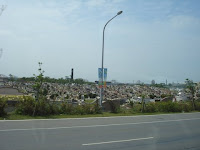Today the children spent the day with their homestay families. This weekend most Taiwanese families celebrate Tomb sweeping.
The Tomb-Sweeping Festival (Qing Ming Jie) is a time to pay respects to one's ancestors and to tidy their gravesite. The date of this festival was set as the third day of the third lunar month during the period of the Wei-Chin Dynasties. In recent years it has been moved to April 5th. As the name of this holiday suggests, the main activity of Tomb-Sweeping Day is for the whole family, young and old, to go to the graveside of deceased family members to burn incense and perform a ritual offering, while at the same time clearing away plant overgrowth from the gravesite.
Its Chinese name "Qing Ming" literally means "Clear Brightness," hinting at its importance as a celebration of spring. Similar to the spring festivals of other cultures, Tomb-Sweeping Day celebrates the rebirth of nature, while marking the beginning of the planting season and other outdoor activities.
In ancient times, people celebrated Qing Ming Jie with dancing, singing, picnics, and kite flying. Colored boiled eggs would be broken to symbolize the opening of life. In the capital, the Emperor would plant trees on the palace grounds to celebrate the renewing nature of spring. In the villages, young men and women would court each other.
Besides the traditions of honoring the dead, people also often fly kits on Tomb Sweeping Day. Kites can come in all kinds of shapes, sizes, and colors. Designs could include frogs, dragonflies, butterflies, crabs, bats, and storks.
With the passing of time, this celebration of life became a day to the honor past ancestors. Following folk religion, the Chinese believed that the spirits of deceased ancestors looked after the family. Sacrifices of food and spirit money could keep them happy, and the family would prosper through good harvests and more children. Today, Chinese visit their family graves to tend to any underbrush that has grown. Weeds are pulled, and dirt swept away, and the family will set out offerings of food and spirit money. Unlike the sacrifices at a family's home altar, the offerings at the tomb usually consist of dry, bland food. One theory is that since any number of ghosts rome around a grave area, the less appealing food will be consumed by the ancestors, and not be plundered by strangers. There were a lot of people taking part in processions and setting off fire crackers today.




No comments:
Post a Comment